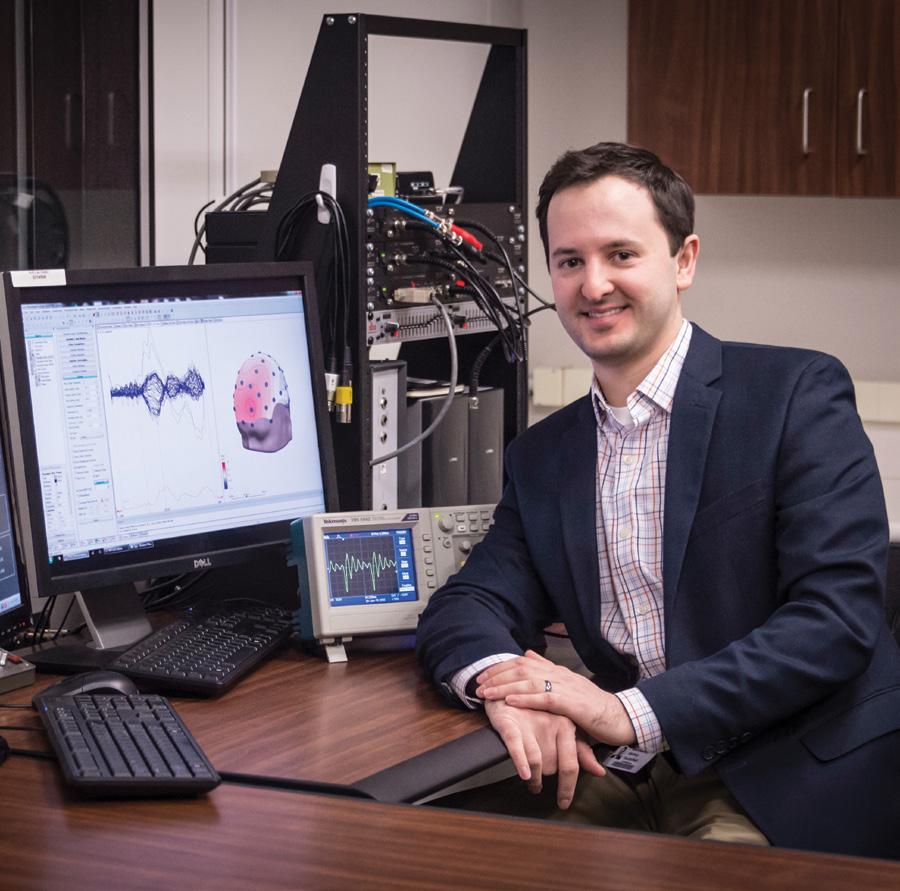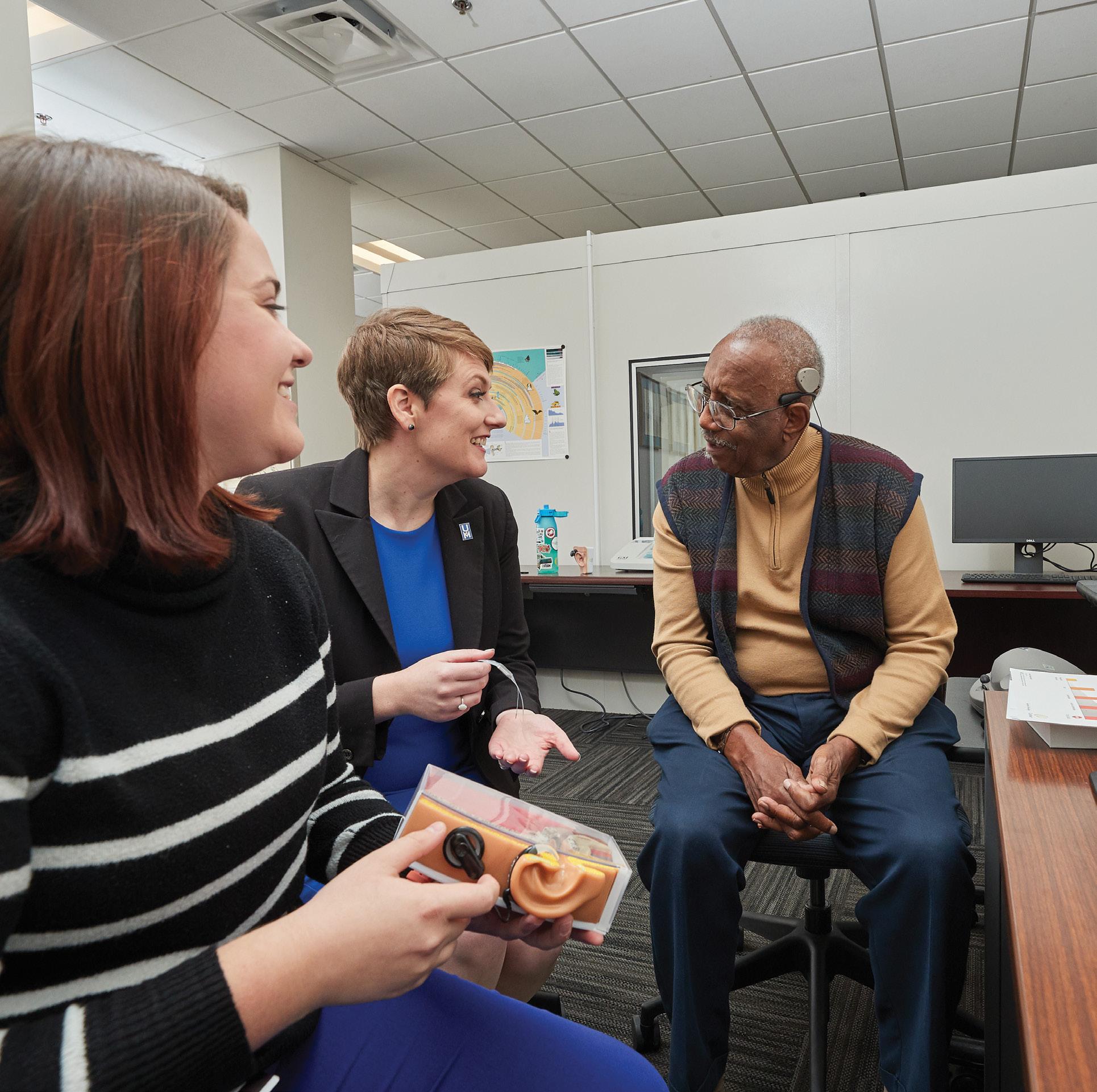
3 minute read
Adult Neurogenic Communication Disorders Laboratory
SPEECH RESEARCH
Lynda Feenaughty, PhD is assistant professor in the School of Communication Sciences and Disorders. Dr. Feenaughty joined the faculty in 2017. She received her BS and MA in Communicative Disorders from SUNY Geneseo and received her PhD in Communicative Disorders at the University at Buffalo in 2016. She currently directs the Adult Neurogenic Communication Disorders Laboratory (ANCD) which is dedicated to research investigating the relationship between neuropsychological function and spoken language behaviors including speech motor control and language characteristics and their perceived speech adequacy secondary to neurodegenerative disease such as Multiple Sclerosis (MS).
Current Research and Applications Dr. Feenaughty’s current research focuses on investigating the relationship between neuropsychological function, speech motor control, and language characteristics, as well as the perceived speech adequacy in patients affected by multiple sclerosis. Multiple sclerosis is a main focus of the ANCD’s research, but other adult neurogenic disorders (Parkinson’s disease, stroke, etc.) affecting typically aging adults are also of interest. Results and data
Research Interests Dr. Feenaughty’s research interests include investigating acoustic and linguistic characteristics of connected speech to determine how cognitive function influences speech motor behavior and perceived speech adequacy in individuals with neurodegenerative disease. This involves taking a deeper look at cognitive-speech motor interaction, respiratory kinematics, motor speech disorders, and the impact of neuropsychological function on spoken language, as well as other associated aspects of this relationship. produced by the ANCD laboratory will enhance traditional clinical management of speech and language disorders and research practices. Additionally, she aims to advance a comprehensive theory of spoken language production that incorporates cognitive, linguistic and motor functions. Dr. Feenaughty regularly collaborates with the Aphasia Lab at the University of South Carolina and the Medical University of South Carolina to study fluency, inducing effects of speech entrainment and social circles in chronic aphasia.
Future Endeavors Future directions of Dr. Feenaughty’s research include studying laboratory methods to quantify normal and disordered aspects of respiratory and laryngeal physiology and incorporating techniques such as neuroimaging (e.g., MRI). These neuroimaging techniques will be used to visualize brain integrity and structural connectivity supporting language and speech motor performance in people with acquired neurogenic disorders to better understand the various aspects of spoken language impairment.

Student Involvement Future graduate students should know that research opportunities are plentiful in Dr. Feenaughty’s lab. Completing a PhD or special project in her lab consists of concentrated readings and discussion of the current theories and models of speech production and perception. Students will also have the opportunity to learn a variety of laboratory methods to quantify neuropsychological status and acoustic and perceptual characteristics of normal and disordered aspects of speech resulting from acquired neurodegenerative disease or other acquired neurologic disorders. Informal learning opportunities (conferences, project meetings) during their experience in the ANCD lab will also be instrumental to expand student’s foundational knowledge of speech acoustics, perception, linguistics and neuropsychology.
Publication Spotlight 1. Feenaughty, L. et al. (2017). Nonfluent speech following stroke is caused by impaired efference copy.
Cognitive Neuropsychology, 1-15. 2. Basilakos, A., Yourganov, G., den
Ouden, D., Fogerty, D., Rorden, C., Feenaughty, L. & Fridriksson, J. (2017). A multivariate analytic approach to the differential diagnosis of apraxia of speech. Journal of Speech, Language, and Hearing Research, 1-15. 3. Feenaughty, L., Tjaden, K. & Sussman,
J. (2014). Relationship between acoustic measures and judgments of intelligibility in Parkinson’s disease: A withinspeaker approach. Clinical Linguistics and Phonetics, 28(11), 857-78. 4. Feenaughty, L. et al. (2013).
Speech and pause characteristics in Multiple Sclerosis: A preliminary study of speakers with high and low neuropsychological test performance. Clinical Linguistics and Phonetics, 27, 134 – 151. 5. Rodgers, J.D., Tjaden, K., Feenaughty,
L., Weinstock-Guttman, B. & Benedict, R.H. (2012). Influence of cognitive function on speech and articulation rate in Multiple Sclerosis. Journal of the International Neuropsychological Society, 19(2), 173-80.











